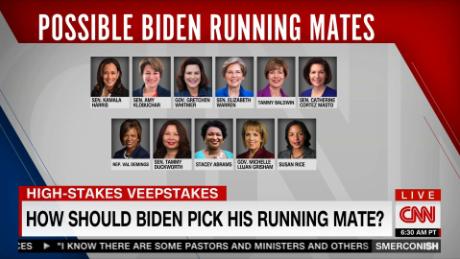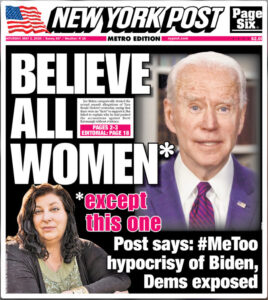Joe Biden has officially begun the search for his very own Joe Biden.
While an announcement about his running mate is not expected until July, this much we know – it will be a woman.
Following Hillary Clinton’s candidacy in 2016 and the success of female candidates in the 2018 mid-term elections, many Democrats have made no secret of their desire to build on this momentum and ensure a gender balance at the top the 2020 ticket.
And yet for all of the diversity on offer during the 2020 Democratic primaries, voters eventually narrowed the field down to two old white men.
“If I’m elected president, my Cabinet, my administration will look like the country, and I commit that I will, in fact, appoint a, pick a woman to be vice president,” Biden said at the CNN-Univision debate in Washington, DC in March.
In previous election cycles the process of selecting a VP candidate – often called the “first decision of a presidency” – has been one that has played out behind closed doors. Presidential nominees share little about their thinking and what might motivate their choice, letting the country, and the press, provide feedback that can help with the vetting process. Potential running mates – generally – avoid engaging in speculation.
When Barack Obama began the search for his running mate in June 2008, it was a guarded process. The committee selected to vet potential candidates reportedly had a list of 20 names, but little was known about who they were or why they had made the shortlist.
Fast forward twelve years and Obama’s eventual pick is holding auditions of his own: earlier and more publically than usual. Potential candidates are vying for air time to pitch why they should be his choice. Party leaders, strategists and special interest groups are all lobbying the campaign to make the case for their preferred candidate.
Biden himself has openly discussed potential names including Senators Elizabeth Warren and Kamala Harris, and Gov. Gretchen Whitmer of Michigan. He has even gone so far as to throw former First Lady Michelle Obama into the mix, claiming he would choose her as his running mate “in a heartbeat.”
On April 30, the Biden campaign announced the formation of an advisory committee that will vet potential vice presidential running mates.
In a press release Biden’s campaign manager Jen O’Malley Dillon announced that the committee would be made up of four co-chairs: Former Sen. Christopher Dodd; Rep. Lisa Blunt Rochester; Los Angeles Mayor Eric Garcetti; and Cynthia Hogan, former White House and Senate counsel to Biden.
“These four co-chairs reflect the strength and diversity of our party, and will provide tremendous insight and expertise to what will be a rigorous selection and vetting process.”
The task facing the committee is not to be underestimated. In 2020 the Democratic party faces many internal questions about its expectations and visions for its future, beyond just the immediate challenge of defeating Donald Trump.
Given that Biden is in the position of having once held the job he is looking to fill, it’s inevitable that his choice will be influenced by his own experiences. But those advising him will be carefully weighing up any number of competing considerations including ideological differences, diversity within the party and the emergence of new battleground states.
With “more than a dozen” women – including significantly, “more than one black woman” currently under consideration – Biden’s choice of running mate may prove to be the most consequential decision of his candidacy.
Here’s why.
Given the former Vice President’s age and the ongoing debate about his stamina for the role, it is a choice that could have significant consequences for the party both in this election year and in years to come.
While not saying so formally, Biden has suggested that he would be a one-term president – serving only four years if he beats President Trump in November.
“I view myself as a transition candidate,” Biden said in a recent online fundraiser.
His mission as president appears to be simple and short-term – take back control of the White House from a leader unfit for the job, clean up the messes left in his wake and attempt to heal a country fractured by partisan politics.
If this is indeed the case, his choice of running mate could be leading the Democratic ticket in four years’ time and find herself essentially setting the party’s agenda for the next decade.
Biden’s choice will therefore have significant consequences for the ideological direction of the Democratic Party.
The Democratic primary season exposed deep ideological divisions within the party – a battle between moderates v. progressives.
Turnout in November will depend on satisfying a number of competing groups of voters within his own party. As a moderate candidate, Biden’s challenge will be to create balance on a ticket that not only appeals to progressive Democrats but can also reach out to disenfranchised/Never Trump Republicans, as well as the roughly half the country that didn’t vote last time.
Geography will be significant in this year’s election as a number of battleground states become competitive. As the Democrats discovered in 2016, the battle for the Electoral College should not be taken for granted.
States won by Donald Trump in 2016 – including Pennsylvania, Michigan, Wisconsin, Florida, and Arizona – are now in play for Joe Biden.
States such as Ohio, Iowa and Georgia, which should safely be sitting in a red column, are now also surprisingly competitive.
As potential candidates battle for Biden’s attention, their selling point could be their appeal to voters in their home states – states in the Midwest or purple states such as Arizona.
Democrats will want to capitalise on the policy issue that enabled their success in the 2018 midterms, and the one that has increasingly dominated the debate as America grapples with the unfolding consequences of the Coronavirus: healthcare.
The immediate challenge for the Democratic ticket will be to demonstrate strong crisis management while articulating a message that reconciles rebuilding the economy with demands for healthcare reform.
Who’s in the running?

Among likely frontrunners are some of Biden’s primary opponents.
Senators Kamala Harris, Elizabeth Warren and Amy Klobuchar are obvious contenders having spent a considerable number of months on the national stage making their cases.
Each brings different strengths and weaknesses that could appeal to the many criteria under discussion.
While Elizabeth Warren appears to poll well with Democratic voters and can bring a strong fundraising platform, she is less popular among major party donors. Wall Street Democrats who are suspicious of her proposed economic reforms are urging the Biden campaign to avoid selecting her. But if Biden wants to engage positively with progressives, Warren would seem an obvious choice, even if Sen Bernie Sanders is reportedly not keen on the idea.
Despite clashing with Biden on the issue of race during the primaries, California Senator Kamala Harris is constantly considered a frontrunner. Charismatic and bringing strong experience to the table, she is a popular choice for many Democrats. However despite being a woman of colour, her criminal justice record as a former prosecutor in San Francisco has led to many concerns within the African-American community.
Amy Klobuchar brings Biden the Midwest. Having helped him win Minnesota in the primaries, a Biden/Klobuchar ticket might flip states such as Michigan and Wisconsin. While Klobuchar could appeal to moderate Democrats and possibly centrist Republicans, progressives are less likely to be enthusiastic.
Michigan Governor Gretchen Whitmer has been cited by Biden himself as a potential running mate and is a rising star in a state that the Democrats desperately want to claim back from Donald Trump. Appealing to both Republicans and Independents, she won over voters from both sides of the political aisle comfortably in 2018. With Michigan one of the states worst affected by the Coronavirus, Whitmer has been targeted by right-wing ‘anti-stay-at-home’ protests and as such has been under the spotlight during the crisis.
Other Midwestern options include Senators Tammy Baldwin (WI) and Tammy Duckworth (IL). While both sit in Senate seats that Democrats would want to avoid giving up, both bring strong attributes to the table.
Baldwin – who made history as the first openly gay senator – has fought off determined fights by Republicans in Wisconsin since being elected in 2012. Her re-election in 2018 coming as a result of a strong campaign to protect those with pre-existing health conditions.
Duckworth – a woman of colour from the Midwest – has an impressive resume: a military veteran and double leg amputee who flew Black Hawk helicopters during missions in Iraq.
Former Georgia gubernatorial candidate Stacey Abrams has been the most vocal of the potential candidates. An African-American woman in one of the most competitive states for Democrats, her inexperience for the role might be the thing that holds her back.
Other names being considered include Sen. Catherine Cortez Masto (D-NV), Gov. Michelle Lujan Grisham (D-NM), Atlanta Mayor Keisha Lance Bottoms and Rep. Val Demings (D-FL).
Hurdles ahead
While the job of becoming Biden’s running mate is now the hottest and most sought-after political vacancy in town, it is not without obstacles for the potential candidates themselves.

Allegations of sexual assault against Biden by a former staffer Tara Reade, will force each of the potential running mates – many of whom have been vocal during the #MeToo era – to confront difficult questions of hypocrisy – it is, after all, a standard they set when they lobbied hard against Brett Kavanaugh’s appointment to the Supreme Court in 2018.
There is no question that any of these potential candidates would bring a number of positives to the ticket, and then to the role of Vice President. The task lies firmly with Biden’s campaign and whether they can accurately predict the mood of the country six long months from now.
For more articles making sense of US politics, see also:
Tipping Point for the Bully Pulpit? – Apr 28
L’Etat, C’est Moi – Apr 16
In Pivotal Week, Virus Leaves Politics in Disarray – Apr 10
Faith and Moral Bankruptcy – Mar 26
In Shadow of Virus, Biden puts Distance Between Himself and Sanders – Mar 18
Last Man Standing – Mar 10
South Carolina – Comeback Kid Set for Super Tuesday Showdown – Mar 2
New Hampshire – Not Even The End of the Beginning – Feb 13
Democrats Look to Put Iowa Behind Them – Feb 8
And read Julia Flanagan on the Democratic debates here:
Democrats face Foreign Policy Test – December
The Road To Iowa Goes Through Georgia – November
A Dozen Deliberative Dems Debate – October
And Then There Were Ten… For Now – September
